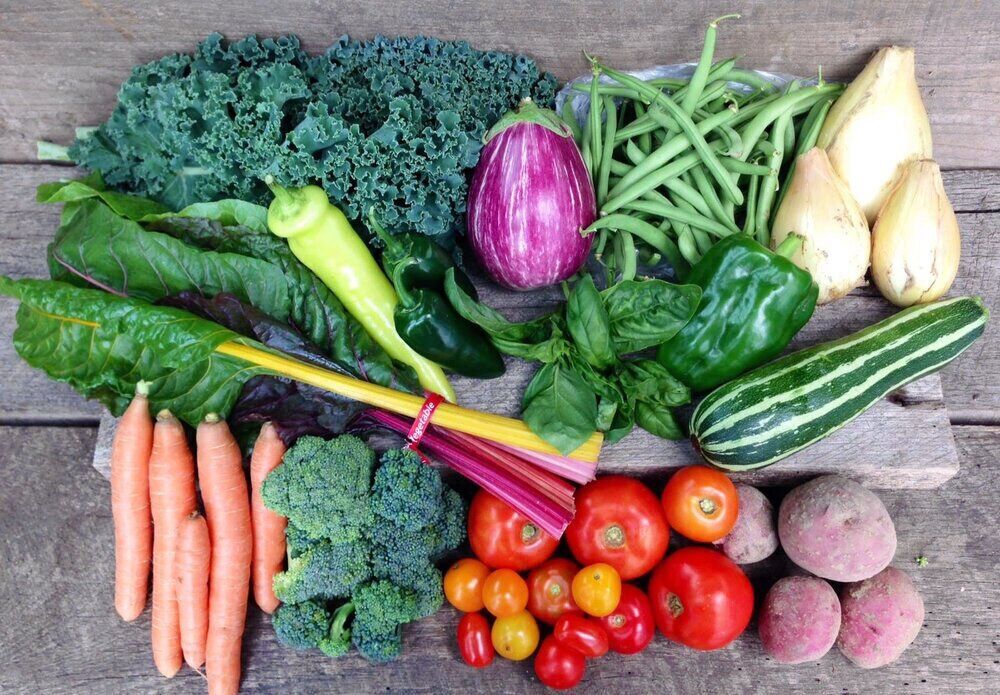Q&A with one state’s single largest CSA grower
Published 4:30 pm Thursday, March 10, 2022

- Example of a CSA summer share. Photo courtesy of Wild Woods Farm.
Perhaps improbably, 2021 was a “beautiful” year for Iowa farmer Kate Edwards.
“I became a mama,” says Edwards, whose daughter was born in March. “And I managed to run the largest CSA in the state of Iowa at the same time. That combination was so empowering!”
Trending
Edwards began farming in 2010, and in 2019, bought the 16 acres she currently works in Solon, near Iowa City. Wild Woods Farm uses a community supported agriculture (CSA) structure to serve close to 300 families who pay in advance for weekly boxes of vegetables from May through November.
Wild Woods farmers grow 30 different kinds of veggies, 150 varieties, and each box (or share) includes up to 10 different items.
Early shares might include radishes, leafy greens and green onions and later, zucchini, potatoes and carrots, then tomatoes, peppers, sweet potatoes and squash. Edwards’ grandparents farmed and she’s proud of her family legacy.
She spoke with Feast and Field about why her CSA flourished during the pandemic, the barriers she faces as a female farmer and which vegetable is her favorite to grow.
You come from a farm family, but your grandmother advised you not to go into the family business. Why?
In the ’70s, the government encouraged farmers to “get big or get out.” Then interest rates skyrocketed, and people who had borrowed money (per the government’s encouragement) were going out of business [and] losing farms. My grandparents held on to their farm in the ’80s, but it was an incredibly traumatic and stressful experience for the whole Midwestern landscape. It (meant) farming was not something that you chose to do; you can’t get into [farming] unless you’re born into it — and if you do get in, there’s a huge family legacy you must uphold. [Being a farmer] is not just something you can become — like an engineer or an artist.
My grandma did not encourage me to farm because their family, like many others, told their kids: “Get a college education so you can make money and have a better life than we had.”
Trending
The bottom line was: economics. She didn’t want to see me suffer.
The drive to farm can seem primal, so losing it must take a real psychological toll.
It’s not just your occupation, it’s your life. If you lose the farm, you lose the life — [and] you lose your whole identity.
What’s the setup like at Wild Woods Farm?
I farmed alone for eight years and then married a non-farmer. He wanted to continue his occupation, so he kept his job. I would be farming whether he had the off-farm job or not, but his job enabled us to have health insurance and retirement. Farming doesn’t really have benefits.
Why do you think so many people returned to community supported agriculture (CSA)?
CSA farms blossomed in the pandemic because people want to know where their food comes from. Every day in the news there’s [a headline]: “You can’t eat onions from the grocery store; you can’t eat this.” My customers don’t even blink at my onions because they know that they’re not the same ones found in grocery stores.
I’m a huge proponent of people figuring out where their food comes from. If all of us would buy our food locally, we would be able to repopulate the landscape with farmers, which would then repopulate the rural communities — and help schools and local businesses thrive. We’d be able to reverse the trends of the economic downturns that happened in rural communities. I firmly believe that we could populate the whole countryside with farms like mine and still have room for more farmers.
Do you run into bias as a woman who farms?
One of the things that’s really important is to not polarize different types of farmers; we’re all farmers. There are very few of us left [and] we need to stick together — but I do think there’s still things that are hard for women versus men.
There’s the language around farming, especially in traditional farming spaces: Even though my grandma milked the cows and butchered the chickens, she called herself a farm wife. [Yet] she was a farmer! There is a whole generation of women that didn’t realize they were farmers. It did a disservice to the women of my generation because we didn’t hear women being called farmers. Women were there all along —they just never had the title.
What’s your favorite thing to grow?
I love growing carrots. It’s a hard thing to do with the soil I have.
As you plan for the 2022 growing season, what are you looking forward to?
We’re growing slowly [and] the slower growth model really helps at this point. We are continuing to share our story on social media, connecting the dots of the past and discovering the next chapter.
We added another generation to the farm this year and realized we’re a family farm. I can’t tell you how many times men have said: “You’re going to quit when you have babies.” And now it’s like, this is what I do. I’m a farmer. The other day, my grandma looked at my baby daughter, and asked: “Are you going to become a farmer like your mama?” My heart melted.
This interview has been edited for length and clarity.

